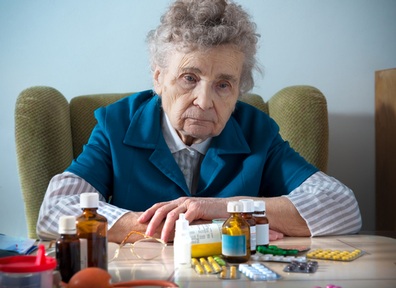Pharmacists drafted into care homes to stop over-medication of elderly
Hundreds of pharmacists are to be sent into care homes to check elderly people are not consuming an unnecessary cocktail of drugs, NHS England has announced.

Care home residents are prescribed an average of seven medicines a day, with many taking 10 or more, costing the NHS an estimated £250 million each year, and leading to fears that the elderly are subjected to a ‘chemical cosh’.
The NHS is sending 200 new clinical pharmacists and pharmacy technicians to check care home residents are receiving the right type and level of medication to improve their health and cut the number of hospital stays.
Not assuming ‘there’s a pill for every ill’
As well as the 200-strong pharmacists already hired, there are plans to recruit thousands more pharmacists to support pensioners in care homes across the country.
England’s chief pharmaceutical officer Keith Ridge said: “Too many patients are prescribed medicines they may no longer need or may need adjusting, which is why the NHS Long Term Plan is funding expert pharmacy teams across the country to give tailored advice to care home residents and extra support to staff to increase the safety and quality of older people’s care.
“Rather than assuming there’s a pill for every ill, increasing the availability of specialist health advice in care homes will mean residents get more personalised treatment, reduced chances of being admitted to hospital and people will have a better quality of life, for longer.”
Elderly residents spend two million days in hospital
There are one million more people aged over 65-years-old age than five years ago. Around 400,000 people live in England’s 17,000 nursing and residential care homes.
Elderly care home residents often have one or more long-term health conditions such as dementia, high blood pressure, diabetes, and they collectively spend around two million days in hospital a year.
Care home residents account for about 250,000 emergency hospital admissions but as much as 40 per cent of these admissions are considered avoidable through actions such as stopping over medication.
The move is one of a number of measures to improve older people’s health and care in the NHS Long Term Plan and is part of a £20 million programme to reduce unnecessary medication of patients.
Failing to understand care home residents’ care needs can mean health problems get missed, which can lead to greater frailty, more falls and lengthy hospital stays.
People want their mum to be ‘properly looked after’
Professor Alistair Burns, national clinical director for dementia and older people’s mental health at NHS England, said: “With many care home residents living with complex conditions, bringing in extra expert health advice will mean the NHS can reduce avoidable drug use, improve care and free up vital funding for better treatment.
“People want to know their mum or grandad is being properly looked after and helping them to live well and with the best possible quality of life is key to that.
“Strengthening the ties between GPs and care homes made a huge difference to residents’ health when we tested the scheme and the NHS Long Term Plan will mean older people in every part of the country soon will benefit from tailored, specialist support in their care home.”
Latest News
 29-Jul-24
Dementia Bus gives carehome.co.uk staff insight into life with dementia
29-Jul-24
Dementia Bus gives carehome.co.uk staff insight into life with dementia
 01-Mar-24
Find out the top care homes in 2024
01-Mar-24
Find out the top care homes in 2024
 21-Mar-23
UK's top care homes in 2023 revealed
21-Mar-23
UK's top care homes in 2023 revealed
 03-Jan-23
carehome.co.uk launches free care helpline
03-Jan-23
carehome.co.uk launches free care helpline
 13-Dec-22
5 mins with Emily Whitehurst, chief operating officer for Constantia Healthcare
13-Dec-22
5 mins with Emily Whitehurst, chief operating officer for Constantia Healthcare